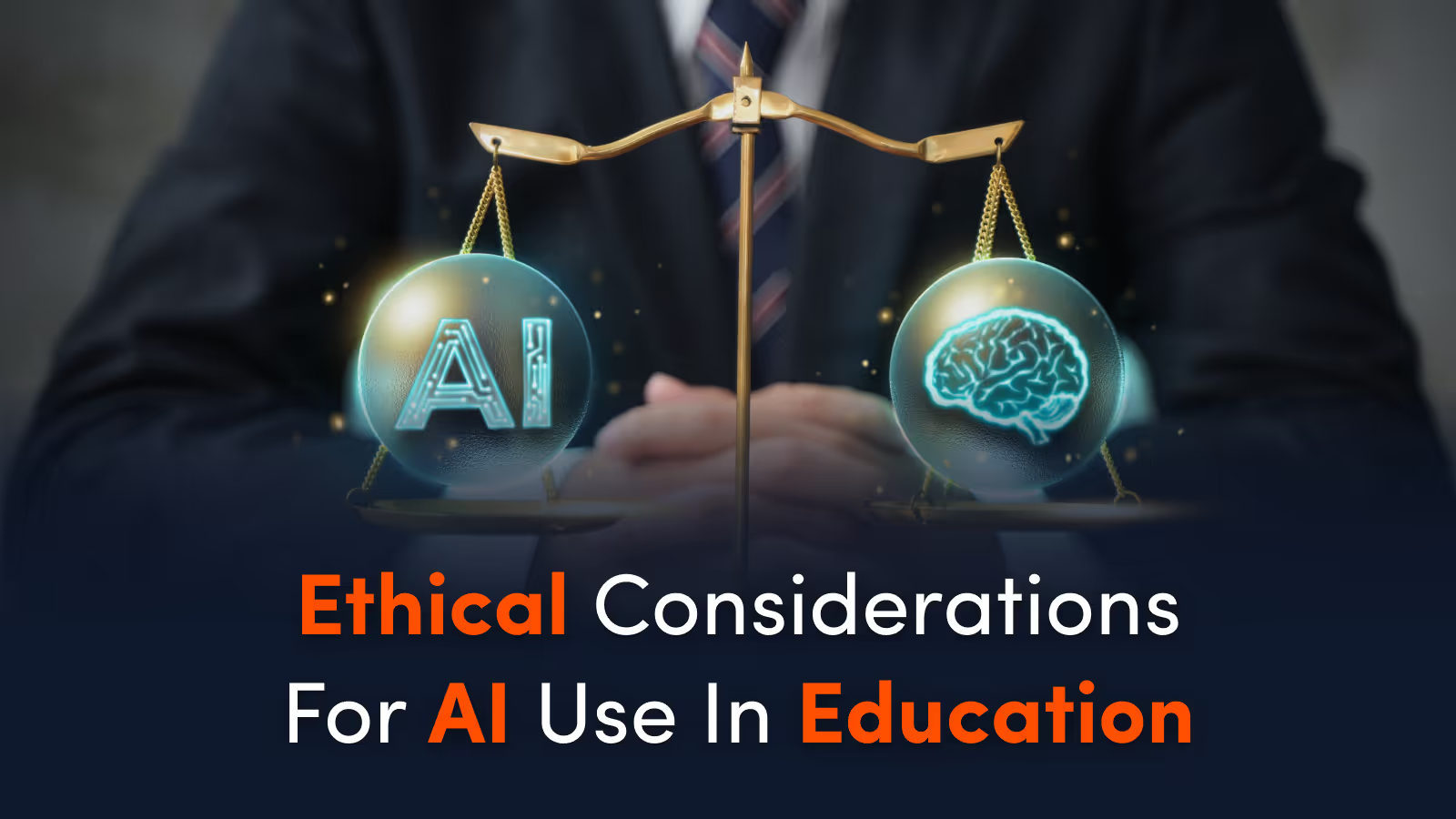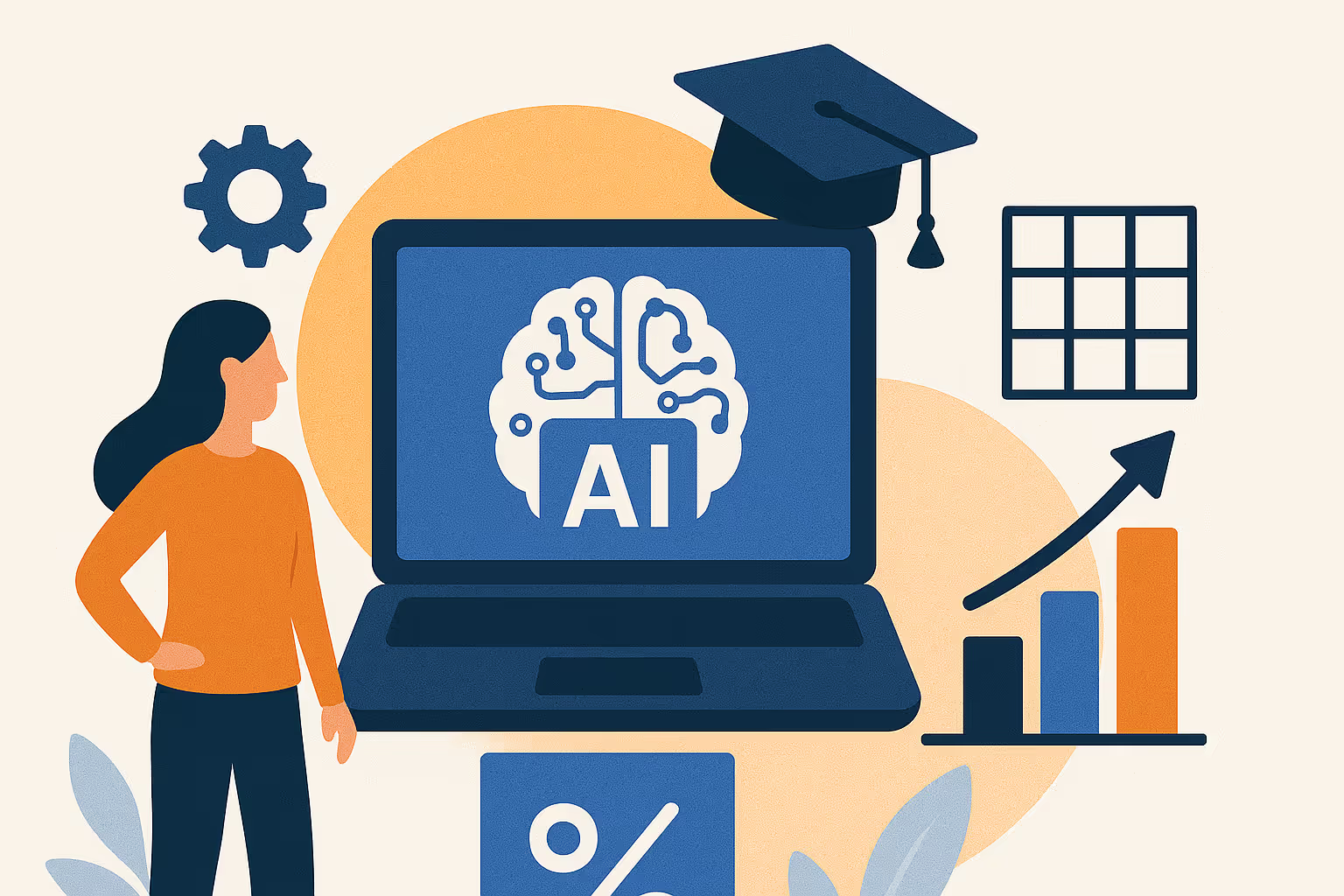About the Blog
The use of AI in education offers transformative opportunities but also raises critical ethical considerations, including data privacy, algorithmic bias, and equitable access. Navigating these challenges requires a thoughtful approach to ensure AI tools enhance learning while upholding fairness and trust in educational systems.
As schools and institutions increasingly rely on AI-powered solutions, it’s essential to consider the ethical implications of this technology. Ensuring responsible use of AI is not just about avoiding risks; it’s about maximizing its benefits in a way that is fair, transparent, and supportive of students and educators alike.
In this blog, we’ll explore how AI is being used in education, the ethical challenges that come with it, and practical steps educators and administrators can take to navigate this rapidly evolving landscape.
What Is Ethical AI In Education?
Ethical AI in education means designing, using, and managing AI tools in a way that puts people first — focusing on fairness, transparency, and the well-being of students and educators.
It’s about ensuring that these powerful technologies help, rather than harm, the learning experience. For example, when an AI system evaluates a student’s performance or helps tailor their learning, ethical AI ensures those decisions are free from bias and based on accurate, fair data. It also means respecting students' and teachers' privacy — guarding personal information and being clear about its use.
But ethics in AI aren’t just about the tech itself. They’re about people and policies. Schools, educators, and even governments play a role in setting rules and expectations to ensure AI supports equity, inclusion, and trust in education. By thinking beyond technology, we can ensure AI is a tool for progress, not a source of unintended harm.
Key Ethical Concerns With AI in Education
Key ethical concerns with implementing AI in education include potential bias in decision-making, threats to student privacy, lack of transparency, and the risk of over-reliance on automated systems.
Bias and fairness in AI algorithms
Bias in AI happens when the outcomes it produces are unfair or skewed due to problems in the data it learns from or how it is programmed.
This can occur if the training data doesn’t include a wide range of perspectives, if the system is poorly designed, or if societal inequalities are baked into the data. For example, in education, bias could show up as grading systems that favor students from specific backgrounds, admissions decisions that unintentionally exclude certain groups, or learning tools that work better for some demographics than others.
These biases can lead to unfair treatment and missed opportunities for students, making it essential to evaluate and address potential biases when using AI carefully.
Privacy and data security for students
AI systems in education collect various types of student data, including personal information (like names and demographics), academic records (such as grades and test scores), and behavioral data (like engagement patterns or online activity). This data is often used to create personalized learning experiences, improve academic outcomes, or streamline administrative processes.
However, the collection and storage of such sensitive data pose significant privacy risks. These include unauthorized access, data breaches, or even the misuse of student information for purposes beyond education. For example, if behavioral data is not properly safeguarded, it could be exploited for non-educational commercial purposes or lead to inaccurate assumptions about students.
To address these concerns, educational institutions must prioritize informed consent and transparency. This means clearly explaining to students and parents what data is being collected, how it will be stored, and for what purposes it will be used. Establishing strict data protection protocols and adhering to privacy laws can help build trust and ensure that student data is handled responsibly and ethically.
Transparency and accountability in AI decision-making
Transparency and accountability are critical for building trust in AI systems used in education.
When students, educators, and parents understand how decisions — such as grades, admissions, or personalized learning recommendations — are made, they are more likely to trust and accept these tools. Transparency means providing clear explanations for how AI processes data and arrives at conclusions, allowing users to evaluate the fairness and accuracy of the system. For instance, if an AI tool suggests a tailored study plan, both educators and students should be able to see the factors influencing those recommendations.
Additionally, a lack of accountability makes it difficult to address and resolve issues, potentially allowing harmful practices to persist. Ensuring that educational AI systems are both understandable and accountable helps prevent errors, reinforces fairness, and fosters confidence among all stakeholders.
Benefits Of Ethical AI in Education
Ethical use of AI in education brings numerous benefits, starting with its ability to create tailored learning experiences.
By respecting individual needs and abilities, AI can help personalize lesson plans, recommend resources, and identify areas where students need extra support — without falling into the trap of biased recommendations. For example, AI-driven tools can suggest reading materials at the right difficulty level or adjust the pace of a math program to match a student’s progress. This approach not only enhances learning outcomes but also ensures that students feel supported and understood.
By streamlining processes, educators can dedicate more energy to teaching, mentoring, and building meaningful relationships with their students, enriching the overall educational experience.
Challenges In Ensuring Ethical Use Of AI
Implementing AI ethically in education comes with several challenges and barriers.
One major difficulty is the lack of comprehensive guidelines and laws specifically addressing AI ethics in education. Without clear standards, institutions often operate in a gray area, making it hard to ensure that AI tools are used responsibly.
This absence of regulation can lead to inconsistent practices, leaving students and educators vulnerable to privacy violations, biased outcomes, or unintended harm caused by poorly designed systems.
Another interesting point to consider is how universities often operate in silos, especially when it comes to decentralized processes like admissions. In such environments, individual departments or colleges may have their own interpretations of concepts like the "ethical use of AI." This decentralized approach can lead to inconsistencies across the institution, creating a patchwork of standards rather than a unified framework.
It begs the question: is there a universally accepted definition of ethical AI use in higher education today, or are we navigating a gray area? The absence of a clear consensus could mean that what one department views as ethical AI use, another might see as a breach of integrity, highlighting the need for more cohesive guidelines and shared understanding across the sector.
Another challenge lies in systemic biases embedded in the data and algorithms powering AI tools. These biases can unintentionally favor certain demographics or disadvantage others, making it difficult to create fair and inclusive systems. Compounding these issues is the limited understanding of AI systems among educators and administrators. Without adequate training or awareness, they may struggle to identify or address ethical concerns, relying instead on technology they don’t fully grasp.
This gap in knowledge highlights the need for education and support to empower educators to use AI responsibly and advocate for ethical practices.
Best Practices For Implementing Ethical AI in Education
Best practices for implementing ethical AI in education include ensuring transparency, providing adequate training for educators, and establishing clear ethical guidelines and regulations.
Ensuring transparency in AI systems
Achieving transparency in AI systems used in education requires clear communication and accessible tools that demystify how these systems function.
Educators, students, and parents should be provided with straightforward explanations of how AI algorithms analyze data and make decisions, ensuring they understand the basis for grades, recommendations, or assessments. Maintaining comprehensive documentation of AI models, datasets, and decision-making processes is essential for accountability, enabling stakeholders to trace and address any issues that arise.
Intuitive interfaces and user-friendly dashboards can further support transparency by presenting insights and outcomes in a digestible format, empowering non-technical users to engage with AI systems confidently and effectively.
Providing adequate training for educators
Educators need proper training to use AI ethically and effectively because it equips them with a clear understanding of how these systems function, their capabilities, and their limitations.
By learning how AI tools analyze data and make decisions, educators can identify potential biases, ensure equitable outcomes, and leverage AI responsibly in their teaching methods. Training empowers educators to align AI integration with ethical principles and educational goals, enhancing personalized learning experiences without compromising fairness or transparency.
Well-informed educators can guide students in understanding and navigating AI-driven tools, fostering a collaborative and trustworthy learning environment.
Establishing clear data privacy policies
Creating and enforcing robust data privacy policies is essential to protect student information when using AI in education.
Clear guidelines should specify what data is collected, how it will be used, and who has access to it, ensuring transparency and trust. Obtaining informed consent from students or their guardians is crucial to respect their autonomy and rights. Additionally, implementing strong encryption and cybersecurity measures helps safeguard sensitive data from unauthorized access or breaches, ensuring the safety and privacy of students' personal information.
The Future Of Ethical AI in Education
Evolving technologies and ethical frameworks are set to redefine education, introducing innovations like adaptive learning platforms, immersive AI experiences, and advanced data analytics to enhance personalized learning. As these tools evolve, ethical guidelines will adapt to tackle emerging challenges, ensuring AI applications remain aligned with core educational values and equitable practices.
Conclusion
Ethical AI in education is vital for fostering fairness, transparency, and inclusivity in learning environments.
Key points discussed include addressing biases in AI systems, ensuring transparency and accountability in AI decision-making, and equipping educators with proper training. By implementing ethical AI practices, educational institutions can create tailored, equitable learning experiences while upholding trust and reliability.
As AI technologies and ethical frameworks evolve, maintaining a balance between innovation and ethics will be essential to support positive outcomes for students and educators alike.
Are AI ethics on your mind? Check out the Higher Ed Pulse episode live from ASU+GSV Air Show where Mallory Willsea chats with Obi Ogbanufe, a Professor at the University of North Texas about having an ethical AI framework.
Frequently Asked Questions
How can parents ensure that AI is used ethically in their child's education?
Parents can ensure ethical AI use in their children's education by staying informed, asking schools about AI tools and data practices, and advocating for transparency and fairness in decision-making processes.
What are the ethical concerns with AI grading systems?
Ethical concerns with AI grading systems include potential biases in algorithms, lack of transparency in decision-making, and the risk of unfair or inconsistent evaluations.










